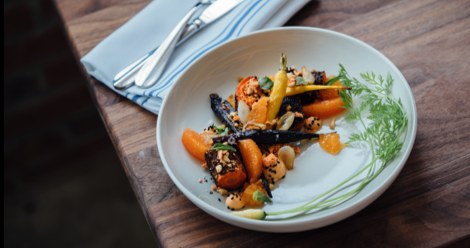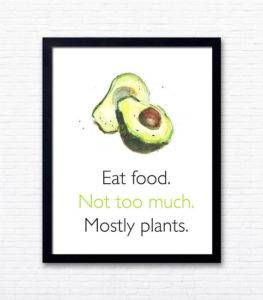
Reading About One of Life’s Greatest Pleasures: Food

Poster by CouturePrintery on Etsy
‘Eat food. Not too much. Mostly plants.’ By now, you’ve probably heard this phrase—the opening line to Michael Pollan’s In Defense of Food. I reread this book recently for the Read Harder challenge, and this led me down a bit of a rabbit hole of books about food. More specifically, the food industry, food marketing, and the particular nutrients found in food.
One of the biggest differences I found between America and Australia when I moved here was the food. Specifically, the bread. In Australia, bread doesn’t have sugar in it. It’s not a sweet food, and if you buy the cheapest loaf from the supermarket (not the fanciest or nicest bread, but it does the job for a sausage sandwich at a barbecue), it will have 0 grams of sugar in it. The same goes for most breads, except the ones that are obviously sweeter, like raisin bread.
When I moved to America, I discovered that even the ‘healthy’ multigrain loaves can have 5g of sugar PER SLICE. Buns/rolls are sweet. Hamburger buns are sweet. A plain old loaf of white bread from the supermarket used for things like sandwiches and toast is sweet. When you grow up eating this kind of bread, you don’t even realise how sweet it is, as my husband discovered after eating a slice of American bread for the first time after months of eating my homemade (sugar-free) bread.
Reading books about the food industry, and particularly the American food industry, opened my eyes to a lot of things. Like how your bread got so sweet. I’ve been reading about the tremendous influence of the food industry: the amount of money spent on lobbying, the influence they have over the government and things like nutritional guidelines, nutrition labels. And I’ve been reading about manipulation: what the health labels on food really mean (have you noticed that the food with health labels tend to be the highly processed foods, and not the ones that are actually healthy?), how you can essentially buy approval from organisations like the American Heart Association, and how food is marketed to children.
This makes me angry, and sad, and a little worried. I love food. I love eating. I like cooking because that leads to eating. I like reading food descriptions in books, looking at food blogs online, browsing recipe books. I like knowing where my food comes from, and what is in it. It’s a little disheartening to realise that there are powerful giants with a great deal of influence over how and what we eat, and who do NOT have our best interests at heart.
And I haven’t even touched on the trends and demonisation of certain categories of food. At one stage, fat was bad for you. Then it was carbs. Then sugar. As I looked at the collection of books I’d borrowed from the library on the topic, I started to think that perhaps I ought not to eat anything at all. That’s not really a feasible solution, however. Instead, I’m trying the next best thing: learning as much as I can about food, the food industry, food politics, and food marketing (an informed eater is an empowered eater, surely?). Cooking most things I eat. Eating real food. Not too much of it. And mostly plants.
If you’d like to join me in this effort to become an empowered eater and heed Pollan’s advice, here are a few books to get you started. These are all, broadly, about food, but I’ve divided the list into a few sub-categories.
Books on world food chains
Stuffed and Starved by Raj Patel
Food Justice by Robert Gottlieb and Anupama Joshi
Books on the food industry in America
Soda Politics by Marion Nestle
The End of Overeating by David A. Kessler
The Omnivore’s Dilemma by Michael Pollan
Salt, Sugar, Fat by Michael Moss
Books on particular nutrients or components of food
The Big Fat Surprise by Nina Teicholz
Grain Brain by David Perlmutter
Sugar Crush by Richard P. Jacoby and Raquel Baldelomar
Books on how and what to eat
These are the books to read if you’re feeling a bit overwhelmed and just want to know what to put in the bloody shopping trolley (these are actually my two most recommended books from this list – if you read nothing else, read these two).
What to Eat by Marion Nestle
In Defense of Food by Michael Pollan
Finally, if you’re interested in this topic and want information in different formats, I also recommend the In Defense of Food and Fed Up documentaries, both of which are available on Netflix in the US.
















